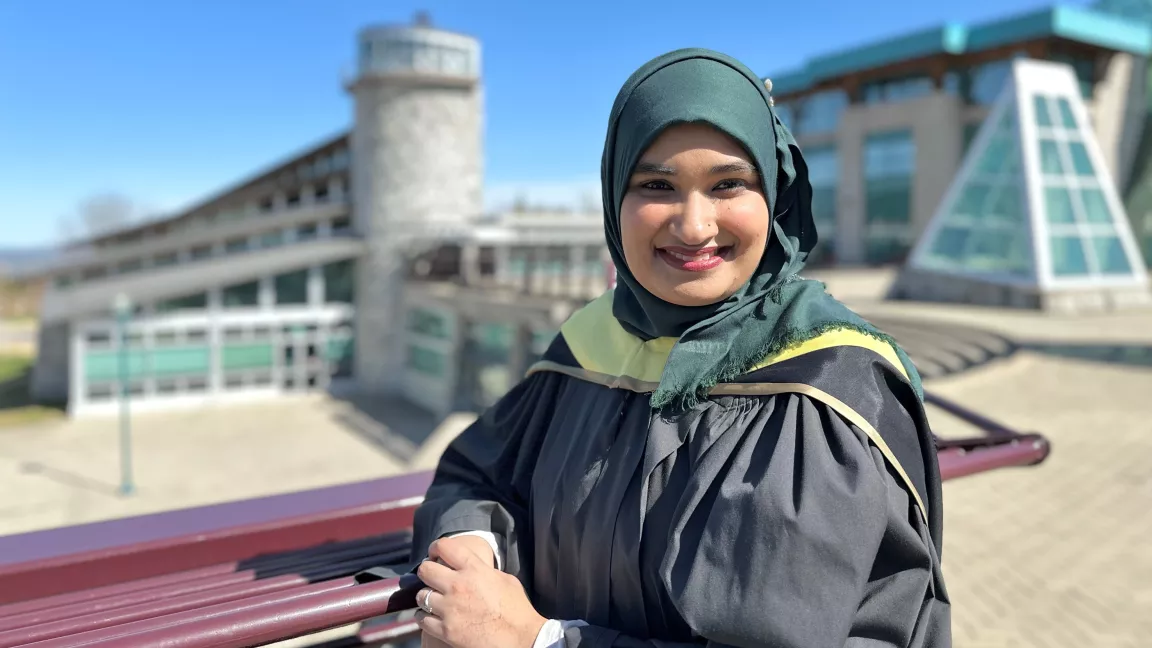Advocating for equity
From her involvement in the University community to her career in the healthcare system, Furqana Khan's journey has been one of advocacy as she looks to amplify marginalized voices. The two-time UNBC graduate is the Valedictorian at Ceremony 1 at UNBC's 2023 Convocation.

As a proud UNBC graduate and a social worker with Northern Health, Furqana Khan has demonstrated a deep commitment to both her roles as a student leader and a frontline healthcare worker. Khan is hopeful the impact of her commitment will extend exponentially as she continues to use her voice and leadership skills to advocate for systemic improvements for marginalized populations.
After graduating from UNBC with a Bachelor of Social Work degree in 2017, Khan then pursued a Master of Social Work degree at UNBC for her ongoing professional development. She will be celebrating the completion of this degree at UNBC’s 2023 Convocation on May 26, where she will deliver the Valedictory address at the morning ceremony.
“I come from a family of health-care professionals and my dad was instrumental in helping me research the field of social work and, ultimately, find what’s become my passion,” says Khan. “From the time I was about 15 years old, I knew I was meant to do social work in the healthcare system.”
Khan’s family moved to Prince George from the Middle East when she was a teenager. She attended College Heights Secondary School and has always coupled her academic pursuits with community engagement and advocacy work.
“Ever since high school, I was always encouraged by my family, role models and mentors to pursue leadership roles,” says Khan. “Because of that inspiration, support, and assurance in the value of my voice, I was able to learn that the full university experience goes far beyond the classes and degrees – the more you pour into it, the more enriched you are by the time you finish.”
After she transferred to UNBC with her diploma from the College of New Caledonia, Khan became fully immersed in the UNBC community as a volunteer, student leader, employee and alumna. She provided note-taking services for students through the Access Resource Centre, acted as a Student Representative on both the Senate and Board of Governors during the years the UNBC navigated academic restructuring and participated on various committees for the School of Social Work, as well as the University at large. She was an early proponent of the Graduate Teaching Assistants joining CUPE Local 2278 and also served a term on the UNBC Alumni Council. She worked on campus in many roles including, but not limited to, being a writing tutor, an exam invigilator, a Graduate Teaching Assistant and an event planning assistant over the years.
During her undergraduate and graduate degrees at UNBC, Khan received numerous scholarships and awards for her academic and non-academic pursuits. While the UNBC Senate honored her with the Student Leadership Award in 2018, she also was the recipient of the UNBC Transfer Student Award, the Canadian Citizenship Celebration Scholarship, and the NBCGSS Legacy Scholarship, among others.
As a result of her involvement at UNBC, Khan was asked to be a student speaker at the University’s annual Donor Appreciation Evening in 2019.
“I spoke from the heart about my experience being the recipient of scholarships from UNBC that changed the trajectory of my educational journey,” she says. “I had many meaningful discussions with the donors afterwards – to be able to thank them in-person was a full-circle moment I had never expected to experience and I am so grateful I had that opportunity.”
Another standout among her experiences at UNBC came during a summer work opportunity that involved thanking the University’s founders, donors and alumni for their continued support.
“I heard stories from people who were part of the original grassroots movement for the University and had set up tables in Pine Centre Mall to gather support for a university up north; people who were part of the first-ever graduating class from UNBC and had to walk from College Heights to classes because there was no initial bus infrastructure; to community members who are genuinely keen to watch UNBC expand into new program areas they’re eager to support.”
Khan says, “Those conversations gave me a newfound appreciation for everything UNBC stands for, gratitude for how far we have come as a community, and excitement for where we are headed.”
As she reflects on her time at UNBC, Khan says her most important takeaway has been the relationships she’s built. “The professors who guided me, the friends I shared notes with during group presentations,, the cafeteria staff who waved to me every day – these are the people who have become my colleagues, clients and my network as I grow forward with my degrees.”
Khan intends to rely on that network of support as she continues to engage and advocate for positive change in northern B.C., in both a professional capacity and as an active volunteer with several local agencies.
“Working in a regional health-care facility, I regularly see people from smaller nearby communities coming to Prince George due to a lack of equitable health care in their communities. I have, and will continue, to use every platform possible to highlight the realities of northern B.C. to the rest of Canada,” says Khan.
“I celebrate this community for everything it has to offer, but there is room for improvement and fortunately I know from experience that there is room at the table for people from marginalized groups to get involved and make the necessary changes.”